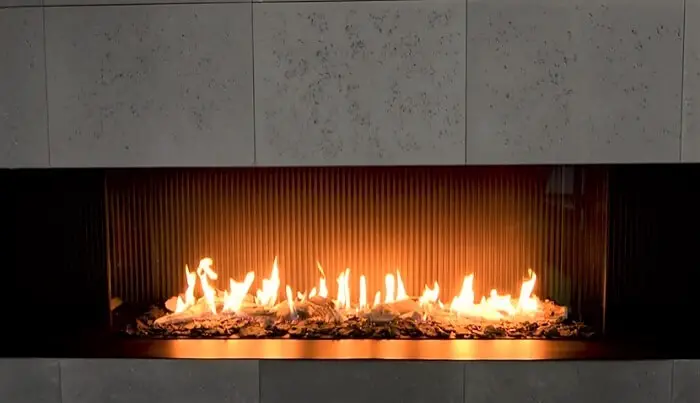Note: This article may contain affiliate links, which means if you make a purchase following our links won’t cost you extra, but we may earn a commission. Learn more
Many people feel comfortable taking the warmth of a gas fireplace at home mainly because it is easy to use and less messy. Because gas or propane gas fireplaces do not require burning wood, there is no ash left. They require less regular cleaning and maintenance. Also, these fireplaces are becoming popular for their aesthetics.
When a gas fireplace is used, it is normal to make a quick noise. This noise is caused by the movement of air and gas through the fireplace. The sound is like the sound of a fan. A rushing sound is usually not a cause for concern, but if the sound is very loud or accompanied by other strange noises, you should be alert.
Are All the Sounds of Your Fireplace Worrying?
If you have a gas fireplace, you’re probably wondering what kind of noises it should be making – and if the noises it’s making are normal. Not all of the noises you hear from your gas fireplace are alarming.
If your fireplace has gas logs, there are a few noises that you may hear from time to time that is considered normal. These sounds can include popping and crackling noises, as well as the sound of air being forced through the vents. You may also hear a hissing noise, which is caused by the release of gas from the logs.
However, if you notice any unusual noises coming from your fireplaces – such as loud banging, or whistling – it’s important to have it inspected by a professional to ensure that everything is functioning properly and safely.

Why does Your Gas Fireplace Make a Rushing Sound?
This sound is caused by the air being drawn into the fireplace to feed the flames. It’s actually quite normal and doesn’t mean there’s anything wrong with your fireplace. In fact, many people find the sound comforting and relaxing.
In some cases, the sound may simply be due to the way the fireplace is constructed and of course is not indicative of a problem.
However, if the sound is accompanied by other symptoms, such as a decrease in heat output, it could be a sign that the fireplace is not functioning properly and should be inspected by a qualified technician.
However, there is a reason why your gas fireplace may be making a rushing sound that the sound is coming from the gas line itself. If the line is not properly sealed, gas can leak out and make a rushing sound as it escapes. Another possibility is that the sound is coming from the combustion chamber of the fireplace. If the chamber is not properly sealed, air can leak in and cause the gas to ignite with a whooshing sound.
If your gas fireplace is making a rushing sound, it’s important to have it inspected by a qualified technician to determine the cause.
Read more: How to Arrange Fire Glass in Your Fire Pit
Gas Fireplace Making Noise When Off
If your gas fireplace is making a hissing noise when it’s turned off, there are a few potential reasons why. To fix the problem, you’ll need to identify the cause of the hissing noise and take the appropriate steps to fix it.
Contracting Metal Frames
If your gas fireplace is making a hissing noise when it’s off, it could be due to the metal frames contracting. This is especially true if you live in an area with a lot of temperature changes. Over time, the metal frames can become loose and start to make noise. The best way to fix this problem is to have a professional tighten the frames.
Leaking Gas
Another reason your gas fireplace may be making a hissing noise is because of a gas leak. If you smell gas or see a flame coming from your fireplace, you should evacuate the area immediately and call your gas company. They will be able to shut off the gas and make the repairs necessary to prevent the leak from happening again.
Loose Components
If your gas fireplace is making a hissing noise, it could also be due to loose components. Over time, the nuts and bolts that hold the fireplace together can become loose. This can cause the components to rub against each other and create noise. The best way to fix this problem is to have a professional tighten the components.
Dirty or Clogged Burners
If your gas fireplace is not burning as efficiently as it used to, it could be because the burners are dirty or clogged. This can cause the fire to make a hissing sound as the gas escapes through the dirt and debris. To clean the burners, remove them from the firebox and soak them in a solution of equal parts water and vinegar. Then, use a small brush to scrub away the dirt and debris.
Cracks In the Firebox
If you notice any cracks in the firebox, it’s important to have them repaired as soon as possible. Otherwise, the escaping gas could cause the fire to make a hissing sound. To repair the cracks, you’ll need to have the firebox professionally relined.
Loose Gas Lines
If the gas lines leading to your fireplace are loose, it could cause the fireplace to make a hissing sound when the gas is turned on. To fix this problem, you can do it yourself. If you are not comfortable, you’ll need to have the gas lines tightened by a professional.
There’s a Leak in the Gas Line
One of the most common reasons why a gas fireplace makes a hissing noise when it’s turned off is because there’s a leak in the gas line. If there’s a small hole or crack in the gas line, gas can escape and make a hissing noise.
To fix this problem, you’ll need to have the gas line repaired or replaced by a qualified professional.
The Damper Is Closed
If the damper is closed, it can cause the gas to back up and make a hissing noise. The damper is a metal flap that’s located at the top of the fireplace. It’s used to control the amount of air that enters the fireplace.
If the damper is closed, gas can’t escape and it can cause the gas to back up and make a hissing noise. To fix this problem, simply open the damper before you turn on the gas fireplace.
The Pilot Light Is Out
If the pilot light is out, it can cause the gas fireplace to make a hissing noise. The pilot light is a small flame that’s located inside the fireplace. It’s used to ignite the gas when you turn on the fireplace.
If the pilot light is out, the gas won’t be able to ignite and it can cause the gas to back up and make a hissing noise. To fix this problem, you’ll need to relight the pilot light.
The Thermocouple Is Faulty
The thermocouple is a safety device that’s located inside the fireplace. It’s used to shut off the gas if the pilot light goes out.
If the thermocouple is faulty, it can cause the gas fireplace to make a hissing noise. To fix this problem, you’ll need to replace the thermocouple.

Gas Fireplace Maintenance
A gas fireplace can be a great addition to any home, but it’s important to keep it properly maintained in order to ensure safe and efficient operation.
Check the glass regularly for soot or other debris. If you see any buildup, clean it off with a soft cloth.
Make sure the flue is open when the fireplace is in use. This will allow harmful gases and fumes to escape safely. If you notice that the flames are low or inconsistent, have your fireplace inspected by a professional technician. It may need cleaning or adjustment.
Many times, the problem is with the pilot light or the gas line. If the pilot light is out, you’ll need to relight it. If the gas line is the issue, you’ll need to contact your gas company to have the line repaired or replaced.
Make sure the gas shut-off valve is turned off when you’re not using the fireplace. This will prevent any accidental fires.
Have your chimney inspected and cleaned on a regular basis by a professional chimney sweep (at least once per year). This will help prevent creosote build-up, which can cause dangerous fires. Gas fireplace maintenance is important to ensure that your unit operates safely and efficiently.